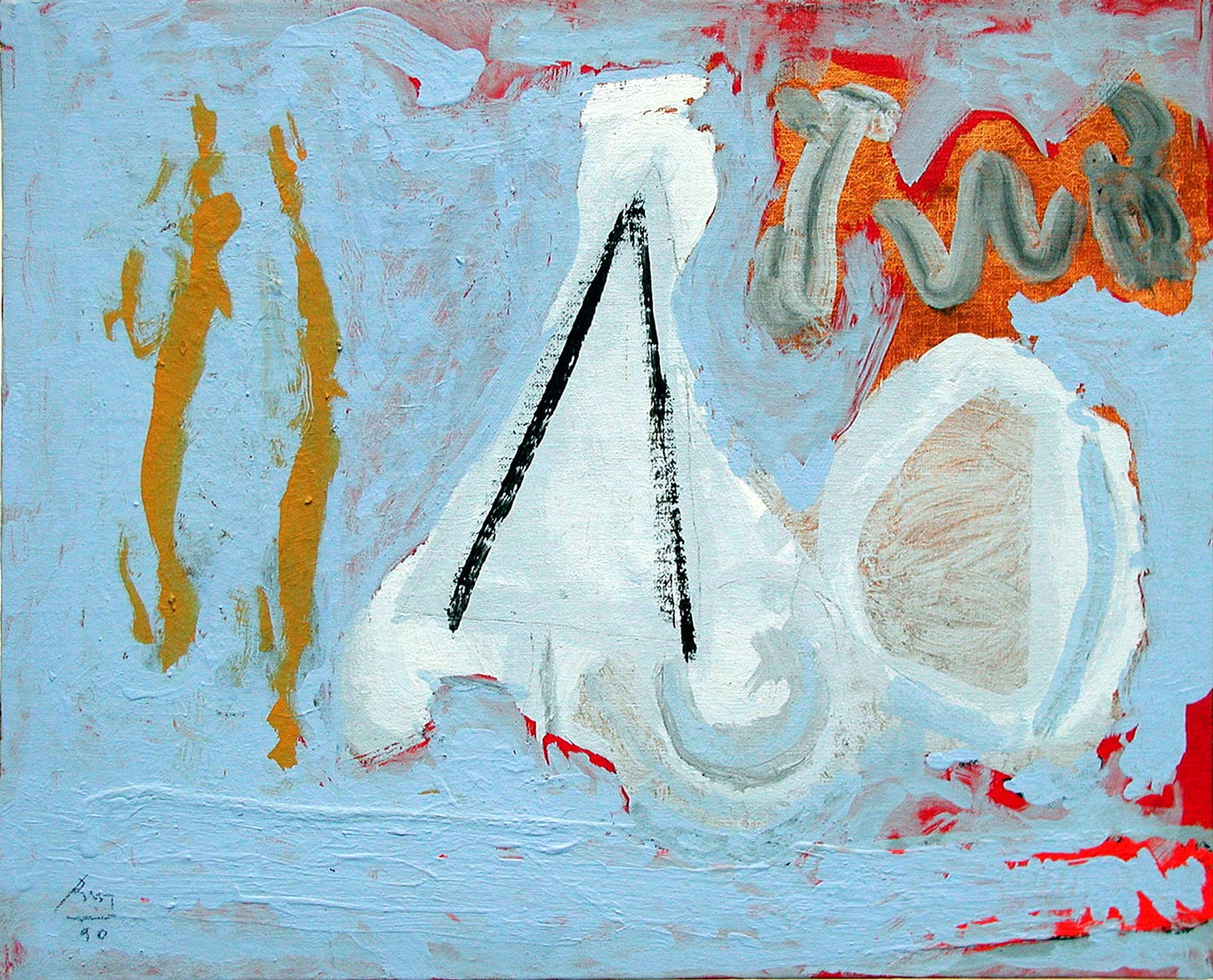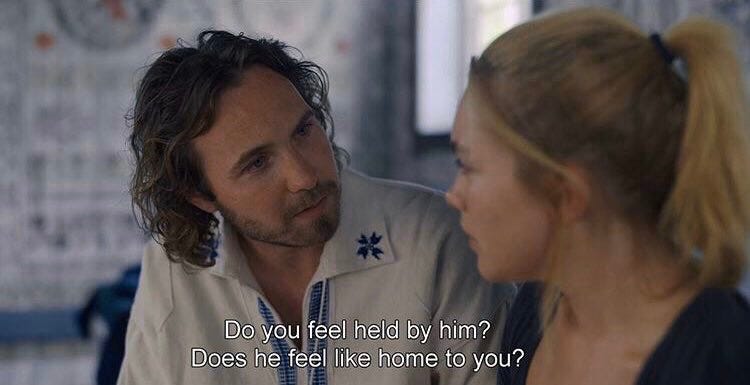the right thing for you will not feel wrong all the time
by Robert Motherwell (1990)
You are reading the free version of Bookbear Express. If you like it, I’m doing a 20% off sale on yearly subscriptions right now and would very much appreciate you supporting my work. Thank you :)
Here’s the really annoying thing: some people just know. They’re in their junior year of college when they meet a girl and immediately decide, I’m going to marry her (and proceed to be right about it). They know the right idea to work on. They know which friendships to hold onto, and how many parties to attend to feel social but not overwhelmed, and which causes to champion. This is the most valuable skill in the world: knowing yourself and knowing your needs. Some people are just preternaturally gifted at it. They make the right choices.
And then, alas, there are the rest of us. This essay is inspired by the excellent Ask Polly post from this morning (go read it!!!) that explored a theme that haunted me in my late teens and early 20s: I thought something was right, even though it felt wrong all the time. Why? Because I over-intellectualized everything and I was so out of touch with my actual needs. This led to not only dating “broken robots,” as Heather puts it, but to feeling weirdly out of sync with the rest of my life.
Here’s what I didn’t understand back then: something being hard is different from something being wrong for you. When something is hard, you might be incredibly uncertain about the outcome, but you’re probably confident in the path, both the day-to-day process of it and the value and the joy. When it’s wrong, it’s out of whack with your basic needs.
The problem is that most of us are not in touch with our needs. That’s something I was reflecting on lately: until I was 23 I’d spent most of my life ignoring my need for sleep (slept very little, then too much), my need for food (ate very little, then too much), and most of my emotional needs (my default reaction to anything hurtful happening was, does this hurt my ability to function? No? Cool). People who are chronic dieters will often say that they need to “restore their hunger signals.” That was me, but for emotional judgment signals.
One thing that I didn’t understand for a long time, which Heather beautifully addresses in the Ask Polly post, is that a relationship should make you feel good basically all the time. Even though this is a dumb-as-rocks observation, you might have internalized something very different growing up. For instance, relationships in my family involve a lot of conflict and ambivalence. This is how everyone I know talks about their relationship: Yeah, if I’d known X about Y, I probably would’ve never gotten together with them, but now we’re going to be together until I die and I guess that’s whatever. I grew up with a very active distaste for conflict, but deeply internalized a tendency for ambivalence. Meaning that historically I am an ambivalent person who is drawn to ambivalent people. It’s true what they say: we emerge from our families with the same level of differentiation that our parents achieved, and then choose people who are approximately as differentiated (replace with “self-actualized” if preferred) as we are. That is: you will be attracted to people exactly as fucked up as you are, continuing to ensure that you remain the same level of fucked up, lol. It’s a self-replicating equilibrium!
But Ava, you might ask me, what if I don’t want to stay the same level of fucked up? What if I want to be like the people you mentioned at the beginning of this post, the people who choose the correct things in their life? The answer to that is the answer to everything, I’m afraid: you have to pay attention to the signals you’ve been ignoring forever and forever. Does this thing feel hard, or does it feel wrong? Are there obvious rewards? Do you feel loved and supported?
Something a friend said to me that blew my mind: if you’re in the right relationship, you probably won’t be second-guessing it all the time in the back of your mind. Simple but radical, right? And yet it’s so hard to believe. What if it’s the right person but not the right time? What if I’m too immature to realize? Fuck that noise. If it’s the right thing, you will want to stay. You will not always, always, always think about leaving. I’m not saying that you’ll know right away, because your instincts will probably work against you, but give it a year. If it’s right, you’ll start to really feel it. If it’s wrong, you’ll start to feel that, too.
For a long time, I had no self-trust: I didn’t believe that I could spot a good thing if I was really in it. I ran away from the things that gave off the signs of actually being correct. Take writing, for example. I’d always received good feedback about my writing. People in my life would tell explicitly tell me that they thought I should try to write full-time. I was happiest and most fulfilled when I wrote. This is not to say I did not receive negative feedback or face disappointments (writing is about rejection, lol!), but let’s just say there were at least signs that I should commit myself to writing and pursue it with some level of vigor. And yet… for years, I just didn’t? I was really afraid of it, so I went into tech instead. I think that on some level of I’ve always chosen ambivalence because I’m afraid of certainty. Because now that I know writing is certainly the thing that means everything to me, writing well is all that matters. The simplicity of that terrifies me, someone who prefers complicated and ambiguous situations. But the terror is good for me. That’s what I’ve learned.
When you find the right thing, it will feel right. You will feel love, and you will feel loved, and it won’t be this tormented half thing. It won’t be a relationship that always leaves you feeling undercut. You won’t need to overthink it or manipulate a thousand different things to make it go right. It will have a momentum of its very own. You might be baffled by the momentum or overwhelmed by it, but you will know that it’s right.
Remember, the goal of your life is not to fix anyone, or—in the manner of overachieving control freaks everywhere—to tyrannize yourself in an attempt to remove all observed flaws. The goal of your life is to get it the fuck together and make the right choices. I wish us both luck.




On being afraid of certainty... don't you think our entire generation is scared of certainty, because the endless flow of information gives us the idea that we have infinite possibilities, and we want to always be available for them? Like, even when we have a good thing going, there will always be something better. Or at least we'll think there is
When it comes to relationships, what is you said is what I learned through marriage and divorce. You will most likely second guess yourself in the first year or so, but there will be a click moment in which it just feels right. Or it doesn't
Lots of insight here, as usual. The distinction between *hard* and *wrong*: Yes! Overthinking is a warning sign: Yes! Expecting a real relationship to make you feel good all the time...that stopped me. I take refuge in the core insights of Rational Emotional Behavior Therapy and Acceptance and Commitment Therapy: No one *makes* me feel anything. Don't expect to feel good most of the time. And don't ask anyone to take responsibility for the way you feel. Sounds hard, but it lightens the load considerably.